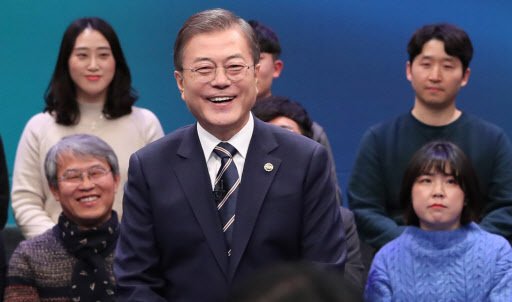November 20, 2019
The president says South Korea will transition to a volunteer army.
South Korea needs to move to a volunteer military system, but the switch from the current conscription system will need time and preparation, President Moon Jae-in said Tuesday.
 |
“(A volunteer system) is something our society must move toward. But at present, the conditions are not right to introduce a volunteer system, (the change) needs to be planned in the mid- to long-term,” Moon said, speaking in a live televised question-and-answer session with 300 selected civilians.
Moon said that measures such as increasing the number of professional soldiers and improving military hardware to reduce the need for soldiers will have to be introduced as the foundations for ending the country’s conscription system.
Moon began the 100-minute session with comments and questions from the audience on the topic of child safety, education and social support systems.
The program — televised live on major terrestrial and cable networks — began with a statement from the parents of a 10-year old who was recently killed in a car accident. The parents have campaigned for strengthened laws on road safety regulations near schools, and requested Moon’s support to push related bills through the National Assembly.
Moon was also posed questions about the government’s support measures for multicultural families and children. In response to questions about the lack of support for children from multicultural families, Moon said his administration will draw up measures to ensure not only unbiased treatment and support for multicultural families, but those that cater to special needs such as religious dietary requirements.
According to Cheong Wa Dae, the event was planned without being prescripted, and the questions posed to the president were not screened beforehand.
The 300 members of the public were selected by MBC from more than 16,000 applicants. Members of the “public panel” were selected to ensure a fair representation of the Korean population by age, gender and region.
According to the broadcaster, more than 16,000 questions were sent in, with economy-related questions accounting for about half, followed by those regarding prosecutorial reform.


